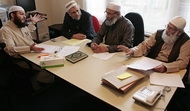A number of non-Muslims using Islamic law to resolve legal disputes in Britain is growing, Muslim Arbitration Tribunal reports.
A spokesman for the Muslim Arbitration Tribunal (MAT) said that there had been a 15% rise in the number of non-Muslims using sharia arbitrations in commercial cases this year. Last year, more than 20 non-Muslims chose to arbitrate cases at the network of tribunals, which operate in London, Birmingham, Bradford, Manchester, Nuneaton and Luton. "We are offering a cheap and effective service for Muslim and non-Muslims," said MAT spokesperson Fareed Chedie.
"95% of the people who come to us for arbitration do not feel they need legal representation." Chedie said that tribunals deal mainly with civil and commercial cases, including mosque disputes referred by the Charity Commission. But the tribunals have also continued to hear cases in the field of family law and divorce, Chedie said.
"We are increasingly dealing with reconciliation and mediation in marriage," said Chedie. "Many of these are cases where women have petitioned because they have a difficult marriage and want some guidance and direction. If they then want to terminate the marriage then we can help with that."
The increase in marriage and divorce cases comes as one law firm has begun offering advice on civil Scots law and sharia law, making it the first in Britain to offer both civil and Islamic law as part of one service.
Glasgow law firm Hamilton Burns says that it is responding to a greater demand from Muslim clients who want advice on sharia law alongside civil advice under Scots law. It has teamed up with Shaykh Amer Jamil, a Muslim scholar who specialises in Islamic family law.
"We hope that by incorporating sharia family jurisprudence against a background of domestic Scottish legislation, we can provide our clients with as much relevant information as possible," said Niall Mickel, a solicitor advocate and managing partner at Hamilton Burns.
But some groups have criticised the move by the Scottish firm, arguing that the recognition of sharia law decisions in Britain is regressive and harmful to women.
"We have a petition signed by more than 22,000 people saying that all religious tribunals should be prevented from operating within or outside the legal system," said Maryam Namazie, a spokeswoman for the One Law for All Campaign, which campaigns against sharia law in Britain. " I have spoken to women who are losing custody of their children in the sharia councils – under sharia law custody of a child goes to the husband after a certain age, irrespective of the welfare of the child.
There are cases of domestic violence where women have dropped criminal charges and the sharia councils have sent the husbands on anger-management courses. That is just not how we deal with domestic violence in this country," Namazie said.
Many Muslim lawyers have challenged criticism of sharia law in Britain as "islamophobic", arguing that there is a distinction between sharia councils – which largely operate outside the law – and arbitration tribunals, which are subject to the Arbitration Act passed by parliament.
"The media get this out of context and hyped up," said Dr Saba Al-Makhtar, from the Arab Lawyers Association. "Under English law there is room to settle disputes on any ground that it is acceptable to the parties involved, provided it doesn't conflict with English law .… it is an extremely good idea."
Critics deny that the campaign against sharia law is targeted specifically against Muslims, however.
"Our campaign is focusing on sharia but we are against all religious tribunals including the Jewish beth din," said Namazie. "Human rights are non-negotiatble and religious tribunals puts religion before people's rights and their freedoms. Law based on any religion – whether the Bible, Torah or the Quran – is completely antithetical to rights woman have in this day and age. Many of the rights women have now result in the UK is the result of a hard fight to wrestle control out of church hands."
Related Links:



